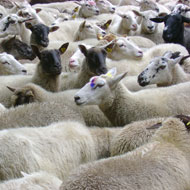Scrapie "could be zoonotic"

Scientists say the zoonotic potential of scrapie should be reassessed.
Scientists have discovered that scrapie - the neurodegenerative disease that affects sheep and goats - could be zoonotic.
Similar to bovine spongiform encephalopathy (BSE), or "mad cow disease", scrapie is caused by pathogen proteins called prions.
BSE has been linked to Creutzfeldt-Jakob disease in humans, but epidemiological studies have not previously been able to show a link between scrapie and human prion diseases.
Lead author Olivier Andreoletti from the French National Institute for Agricultural Research (INRA), said: "Risks of transmitting scrapie to humans were hitherto considered negligible because of the species barrier that naturally prevents prion propagation between species".
INRA scientists have now discovered, however, that certain pathogens responsible for scrapie are in fact able to cross this barrier.
Using rodent models, the team also found those pathogens able to cross the barrier were indistinguishable from the prions causing the sporadic form of CJD.
Writing in the journal Nature Communications this month, the authors of the research say the zoonotic potential of scrapie should be reassessed.
However, as CJD is rare - around one case per million per year - the authors stress that even if future studies find scrapie to be zoonotic, it is unlikely to present a major new threat to public health.



 The Veterinary Medicines Directorate (VMD) is inviting applications from veterinary students to attend a one-week extramural studies (EMS) placement in July 2026.
The Veterinary Medicines Directorate (VMD) is inviting applications from veterinary students to attend a one-week extramural studies (EMS) placement in July 2026.